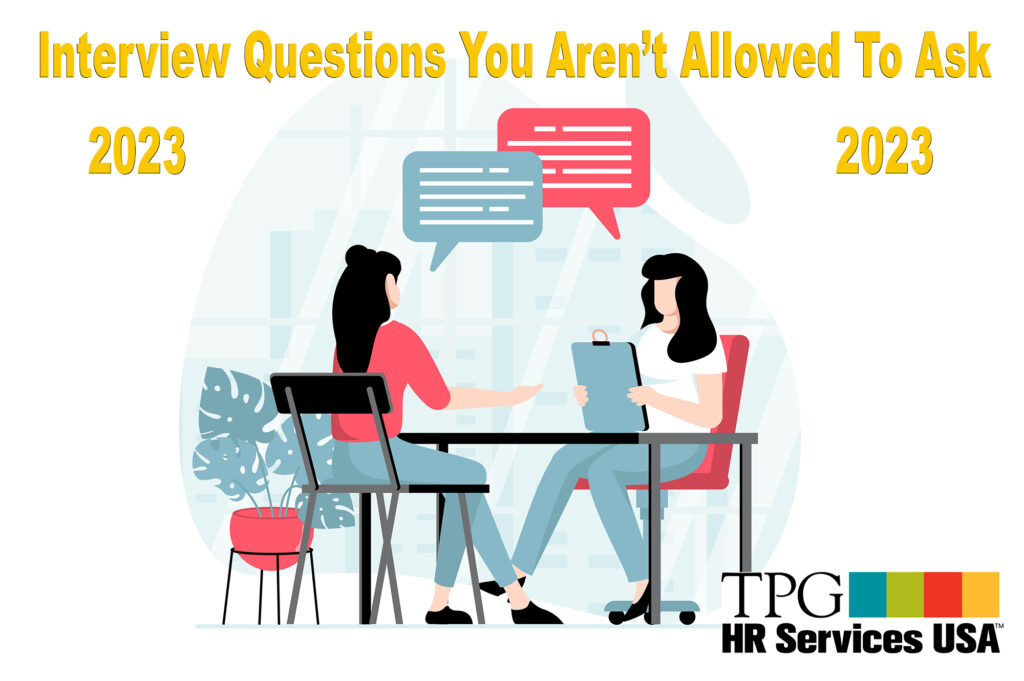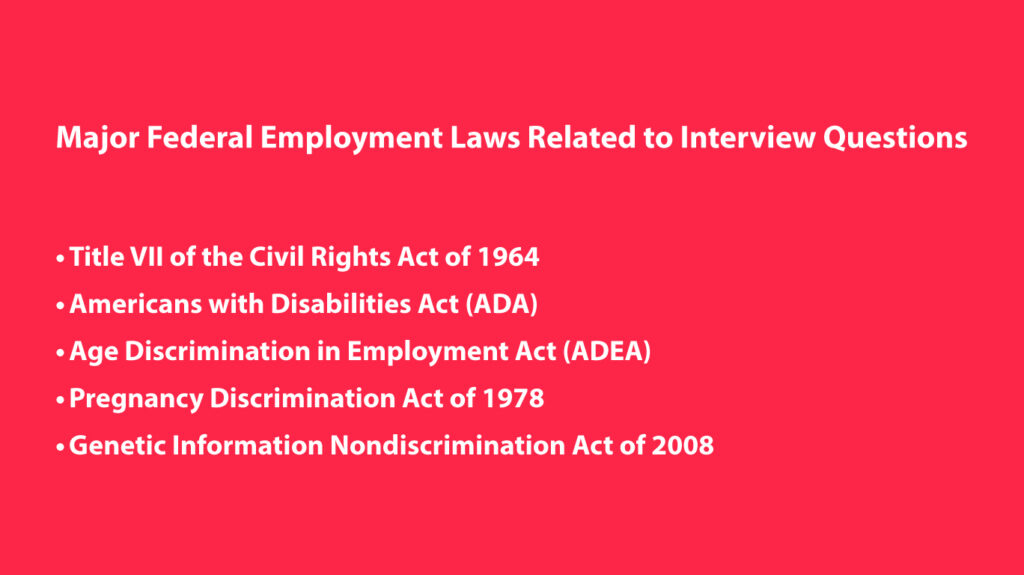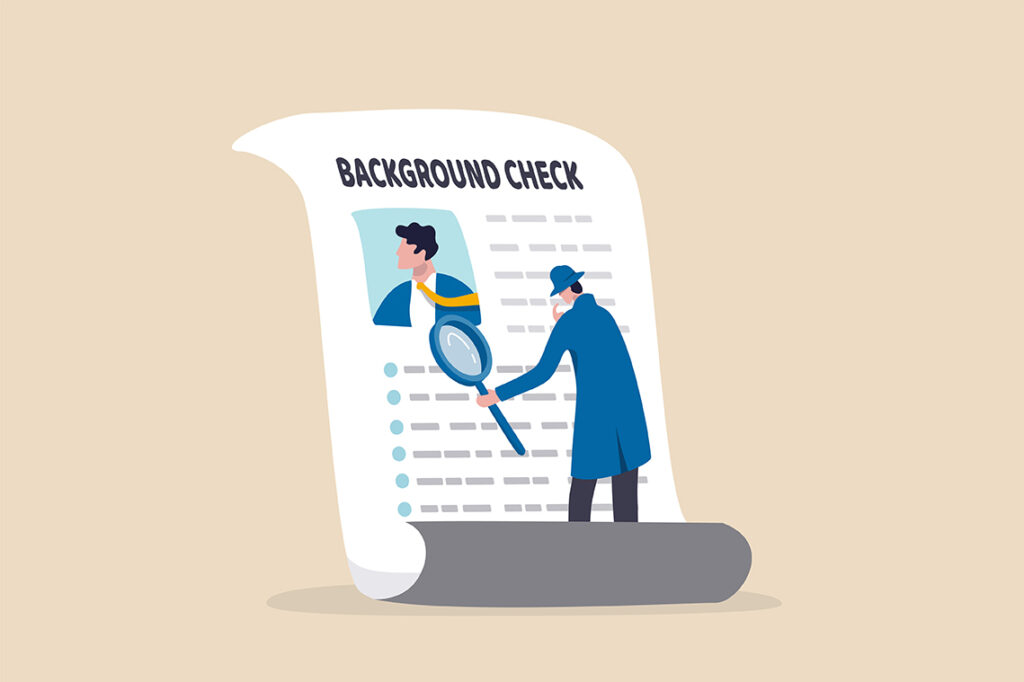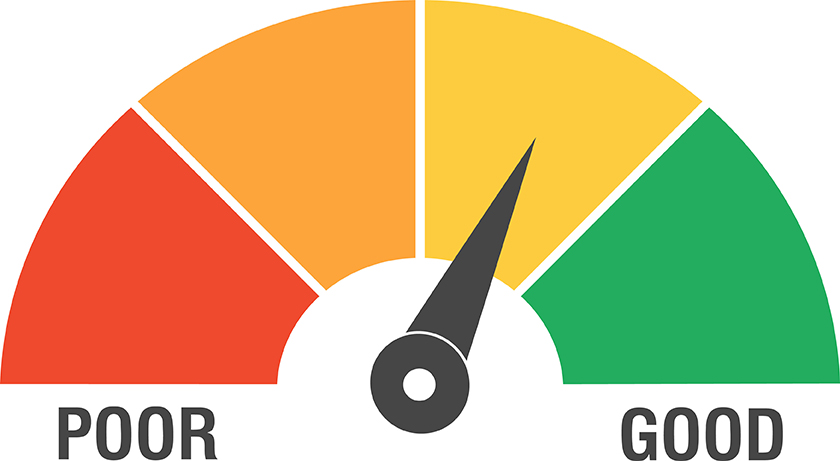
2023-Prohibited Interview Questions You Aren’t Allowed To Ask

Ms. Pomerantz is the CEO of TPG HR Services USA and has over 35 years of Human Resources practices experience. She holds a Master’s in Human Resource Management (MHRM) and is a certified Senior Professional in Human Resources (SPHR) and SHRM Senior Certified Professional (SHRM-SCP). Mary also serves as CEO of Mary Pomerantz Advertising, one of the largest recruitment advertising agencies in the country. Earlier in her career, she was president of the 17th largest staffing firm in the country.

Interviewing a job candidate is a great opportunity to get a better sense of whether the individual would be a good fit for your open position, beyond the details contained in their resume. However, in an attempt to get to know a candidate better, interviewers can sometimes (usually inadvertently) ask prohibited interview questions that violate employment laws or standards. To avoid doing this, it is good to have a set of guidelines to follow when interviewing potential employees, so that you don’t make the mistake of asking prohibited interview questions.
Broad Areas to Avoid
A good rule of thumb to always follow is to never ask interview questions that reveal information that could be used to discriminate against applicants. Oftentimes, even an innocent “icebreaker” type question can fall into this category, potentially putting the interviewer and their company into legal jeopardy with regard to Federal or State employment law and regulations. The best practice is simply to avoid asking the job candidate questions about any of the following areas:
- Race, ethnicity, national origin, or citizenship
- Age
- Gender identity or sexual orientation
- Disabilities
- Medical information, including genetic background or existing or planned pregnancy
- Family or marital status
- Household situation
- Religious affiliation or church attendance
- Arrest record
- Military status
- Financial information

Questions about race, ethnicity, national origin, or citizenship
Questions about these topics should be avoided, even if they come up naturally as part of a conversation when getting to know a candidate. Just because an applicant might bring up their ethnicity or cultural background doesn’t mean you should ask further questions about it – even if it might lead to a seemingly awkward shift in the conversation back to more relevant job-related topics. The following are some examples of specific questions to avoid asking in these areas:
- What is your accent?
- What’s your native language?
- What country are you from?
- Are you a citizen?
- Where do you live?
- Were your parents born in this country?
- That’s an interesting name; is there a story behind it?
“Employers need to be sure that their interview questions are the same for all candidates, and that [questions] relate strictly to the knowledge, skills, and abilities required to be successful in the role.” – Jana Tulloch, HR consultant
Source: The Society for Human Resource Management, https://www.shrm.org/resourcesandtools/hr-topics/talent-acquisition/pages/interview-questions-hr-trouble.aspx
Questions about the applicant’s age
Ageism is discrimination, and only very few positions are allowed to have minimum or maximum age limits as a bona fide occupational qualification. It is always best to steer clear of all questions that might reveal a person’s age in the interview process, even obliquely. Sometimes, saying things such as “You seem overqualified for this position” can be taken as a subtle type of age discrimination that you should be aware of. Some specific questions to avoid asking in an interview include:
- How old are you?
- When were you born?
- When did you graduate high school/college?
- Are you a millennial?

Questions about gender identity or sexual orientation
Gender and sex discrimination are illegal, and questions about these topics should be avoided during the interview process. Even questions such as “Would you be comfortable working with gay colleagues?” might be seen as prying into the candidate’s own sexual orientation. The following are some specific questions related to gender identity or sexual orientation to refrain from asking during the interview process:
- What gender do you identify with?
- What is your sexual orientation?
- Have you ever had transition treatments or surgery?
- How do you feel about LGBTQ rights?
Questions about a candidate’s disabilities
When conducting an interview, it is unlawful to ask about a candidate’s disability status. The only question you can ask if you are concerned about the impact of a candidate’s disability is if they can perform the essential responsibilities of the job with proper accommodation. Some questions to avoid include:
- Do you have any disabilities we should know about?
- How did you lose your arm/leg?
- Is that wheelchair for a temporary condition?
- Have you ever filed a disability claim?
- Are you on disability now?
Legal vs. Illegal Interview Questions
| Legal | Illegal | |
| Work/Visa Status and Citizenship | Are you authorized to work in the U.S.? What languages do you speak (if relevant to the position)? | Are you a U.S. citizen? You sound like you have an accent, where are you from? Where were your parents born? What is your native language? |
| Marital/Family Status | Are you willing and able to put in the amount of overtime and/or travel the position requires? Are you willing to relocate? | Are you married? Do you have children? If so, what do you do for childcare? Are you planning to have children soon? Have you ever been divorced? Where is your spouse employed? |
| Age | Do you have any concerns about handling the long hours and extensive travel that this job entails? Are you at least 18 years of age? | How old are you? When were you born? How long have you been working? |
| Disability Status | Are you able to perform this job with or without reasonable accommodation? Do you have any conditions that would keep you from performing this job? | Do you have any disabilities or medical conditions? How is your health? Do you take any prescription drugs? Have you been diagnosed with a mental illness? Have you ever been an alcoholic? Have you ever been in rehab? |
| Religion | Can you work on weekends? (should only be asked if the position requires working on weekends) | What is your religion? Are you practicing? |
Questions about medical information, including genetic background or existing or planned pregnancy
Questions about medical information should never be part of a job interview unless there are specific health hazards inherent to the position for individuals with specific health issues. Even if this is the case, it is best to consult with legal counsel before asking specific questions related to medical information about a candidate. This includes questions about current or planned pregnancy status – as this can also fuel claims of gender or sexual orientation discrimination. It is best to avoid all questions in this area, such as:
- Did you take an extended medical leave during your last employment?
- Do you have any chronic medical conditions we should know about?
- Has anyone in your family been diagnosed with [insert specific condition here]?
- Do you have a history of genetically transmitted diseases?
- Did you file a workers’ compensation claim/work injury claim in the past year?
- Are you pregnant?
- Do you plan to have children?

Questions about an individual’s family or marital status
Many people love to talk about their families, and candidates may bring up children or spouses naturally during an interview. However, that doesn’t mean that you should follow up with further specific questions regarding a candidate’s family or marital status. Questions to avoid in this area include:
- Are childcare arrangements an issue for you?
- Are you single/married/divorced?
- Are you in a long-term relationship?
- Do you have children?
- How old are your kids?
Questions about an applicant’s household situation
Although the increase in work-from-home arrangements because of the pandemic has made an individual’s household situation more relevant to their ability to work from home, it is still best to stay away from questions regarding an applicant’s household dynamics as these are issues that can stray into more clearly prohibited areas of inquiry during a job interview. Therefore, it is best to avoid asking interview questions like:
- Are you financially responsible for any dependents?
- What does your spouse do for a living?
- Do you live with your parents or with roommates?
- Do you rent or own your home?

Questions about religious affiliation or church attendance
With the rare exception of religious organizations hiring employees, asking about religious affiliation, beliefs, or attendance is something that should never be done during a job interview. Even if an applicant brings up their religion or church attendance in passing during an interview, you shouldn’t respond with any questions relating to it. This can too easily be misconstrued as the basis for a religious discrimination claim. When interviewing a job candidate, prohibited interview questions you should refrain from asking include:
- Will you need days off for religious holidays or days of worship?
- What denomination is that church you mentioned?
- Will your religious background prevent you from doing [x, y, or z]?

Questions about their arrest record
Although some questions regarding a person’s criminal record may be permissible, particularly for certain specific positions, you need to be careful to comply with the relevant federal and state regulations that apply. Prohibited interview questions you should avoid asking during an interview include:
- Have you ever been arrested?
- What was the crime you committed?
Questions about the candidate’s military status
Unless your company runs an affirmative action program or support program for veterans, you are not allowed to make hiring decisions based on a candidate’s past, current, or future military status. As the military is an important formative experience for many veterans, they may bring up the subject during an interview. However, this doesn’t allow you to ask questions about their current military status that could be construed as using this as a basis for their potential hiring. As such, you shouldn’t ask questions related to this topic, such as:
- Do you expect to be deployed in the near future?
- Were you honorably discharged from the military?
- Did you see any combat?

Questions about an individual’s financial situation
Many states have regulations regarding questions that can be asked and checks that can be run on a person’s financial status who is seeking employment. This area has seen new regulations in various states over the past few years. As such, it is important that you are aware of the most recent regulations in your state regarding this type of information. Prohibited interview questions to avoid asking may include the following:
- How much did you earn in your previous position?
- What is your credit rating?
- Do you own a car?
Following these Guidelines Can Protect You and your Company
Recruiting new employees is a difficult enough task without complicating it further with accusations, complaints, or even lawsuits alleging discriminatory hiring practices. The best way to avoid these pitfalls is to follow a clear set of guidelines on what types of questions to ask – and which to avoid – during the interview process. This will protect you and your organization from even the appearance of any sort of hiring impropriety, preserving your company’s recruitment brand in today’s highly-competitive search for talented and experienced candidates. Hopefully, this compilation of prohibited interview questions you aren’t allowed to ask will help you and your organization stay in compliance while recruiting the best candidates for your organization. Remember that TPG HR Services can also assist your recruiting efforts by recruiting for you or helping facilitate any part of the recruiting process.
